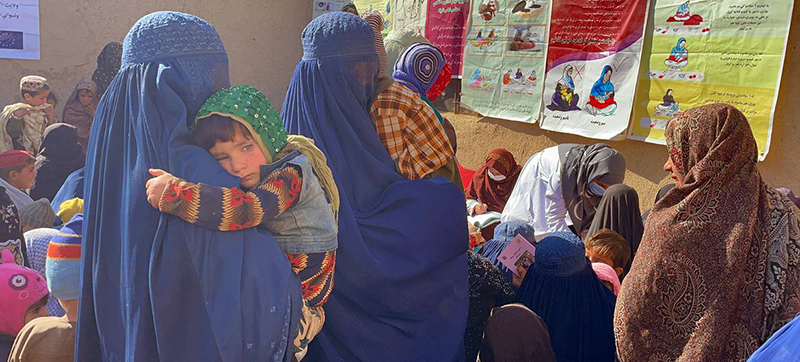 Afghanistan
Afghanistan Afghanistan: Women tell UN rights experts ‘we’re alive, but not living’
New York: Following a systematic crackdown on the rights of Afghan women and girls by the Taliban – from attending school to working at the UN – “the stage may be set for multiple preventable deaths that could amount to femicide” unless restrictions are reversed rapidly, independent UN human rights experts announced on Friday, following an eight-day visit to the country.
“We are alarmed about widespread mental health issues and accounts of escalating suicides among women and girls,” they said in a joint statement. “This extreme situation of institutionalized gender-based discrimination in Afghanistan is unparalleled anywhere in the world.”
‘Extreme’ discrimination
Since the Taliban seized power in Afghanistan in 2021, de facto authorities have issued a cascade of restrictive orders that amounts to “extreme institutionalized gender-based discrimination” and a systematic chipping away of the rights of women and girls, they warned.
The ongoing “appalling” human rights violations have masked other underlying manifestations of gender-based discrimination that preceded the Taliban’s rule and are now “deeply engrained in society and even normalized”, they added.
Currently, females are prohibited from being in school above sixth grade, including universities, can only be provided care by women doctors, and are barred from working at the UN and non-governmental organizations (NGOs).
‘Life under house arrest’
Special Rapporteur on the situation of human rights in Afghanistan, Richard Bennett, and the Chair of the working group on discrimination against women and girls, Dorothy Estrada-Tanck, shared their preliminary observations, including meetings with Taliban leaders and grave accounts from the women and girls they met in Kabul and Mazar-e-Sharif, in Balkh province, between 17 April and 4 May.
“Numerous women shared their feelings of fear and extreme anxiety, describing their situation as a life under house arrest,” they reported.
“We are also particularly concerned by the fact that women who peacefully protest against these oppressive measures encounter threats, harassment, arbitrary detentions and torture,” they said.
Extreme misogyny
For two years, the de facto authorities have dismantled the legal and institutional framework and have been “ruling through the most extreme forms of misogyny”, destroying the relative progress towards gender equality achieved in the past two decades, they said.
In meetings with the Taliban, the experts said de facto authorities had told them that women were working in the health, education, and business sectors, and that they were ensuring that women can work according to Sharia, separated from men.
The de facto authorities reiterated their message that they were working on the reopening of schools, without providing a clear timeline, and indicated that the international community should not interfere in the country’s internal affairs, the experts added.
However, they noted that the Taliban impose certain interpretations of religion “that appear not to be shared by the vast majority of Afghans”.
‘Alive, but not living’
The experts said that one of the women they spoke with told them, “we are alive, but not living”.
The consequences of the restrictive measures have led to detention for alleged “moral crimes” under extreme “modesty rules”, they said. New laws have also decimated the system of protection and support for those fleeing domestic violence, leaving women and girls with absolutely no recourse.
The impact is alarming, the experts said, noting that new Taliban-imposed measures have reportedly contributed to a surge in the rates of child and forced marriage, as well as the proliferation of gender-based violence perpetrated with impunity.
“These acts do not occur in isolation,” they cautioned. “If we are to eliminate discrimination and break cycles of violence, gender justice requires a holistic understanding as to why such violations are committed.”
‘Gender apartheid’
The world “cannot turn a blind eye,” they warned.
They recommended that the international community develop further normative standards and tools to address “the broader phenomenon of gender apartheid” as an institutionalized system of discrimination, segregation, humiliation, and exclusion of women and girls.
At the same time, the UN should take a human rights-based approach which requires a deep understanding and analysis of its principles, they said.
Technical and financial partners should considerably increase their support to activists and grassroots organizations present in Afghanistan and to the unwavering efforts of a “still vibrant civil society” to avoid the complete breakdown of civic space which could have irreversible consequences, they recommended.
They urged the de facto authorities to honour commitments towards the protection and promotion of all women’s and girls’ rights and comply with obligations under instruments to which Afghanistan is a State party, including the Convention on the Elimination of All Forms of Discrimination Against Women (CEDAW).
Special Rapporteurs
The experts expect to present to the Human Rights Council in June a joint report thoroughly analysing the situation of women and girls’ rights in Afghanistan, followed by an interactive dialogue with Afghan women.
Special Rapporteurs and other rights experts are appointed by the UN Human Rights Council, are mandated to monitor and report on specific thematic issues or country situations, are not UN staff and do not receive a salary for their work.
Support Our Journalism
We cannot do without you.. your contribution supports unbiased journalism
IBNS is not driven by any ism- not wokeism, not racism, not skewed secularism, not hyper right-wing or left liberal ideals, nor by any hardline religious beliefs or hyper nationalism. We want to serve you good old objective news, as they are. We do not judge or preach. We let people decide for themselves. We only try to present factual and well-sourced news.







